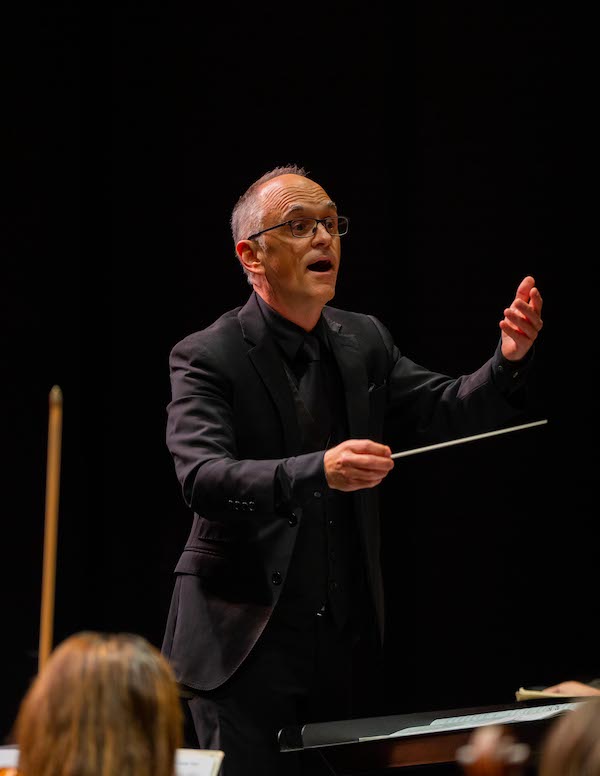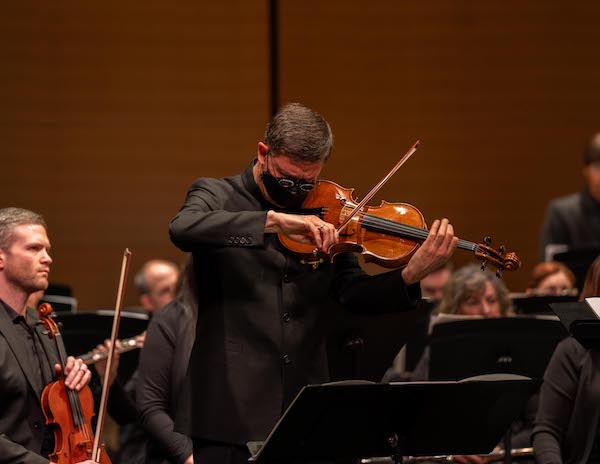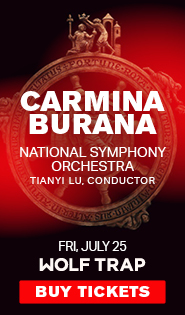Neely brings fresh fire and polish to Apollo Orchestra

David Neely conducted the Apollo Orchestra Sunday in Silver Spring. Photo: Eddie Sanders
The Apollo Orchestra is in the midst of a leadership change. According to Virginia Lum, the ensemble’s executive director, Stephen Czarkowski is no longer Apollo’s music director, a change since the group’s most recent concert.
Guest conductor David Neely, director of orchestral activities at the University of Maryland since 2019, took the helm for an excellent concert Sunday afternoon, in the Cultural Arts Center at Montgomery College in Silver Spring.
Lum noted that the orchestra is “exploring conductor possibilities,” giving Neely’s appearance added importance, especially since he will return as guest conductor next March. Based on the sound Neely drew out of the orchestra, which sounded confident and crisply coordinated through a rather challenging program, he should be considered a strong candidate for a permanent role.
John Adams spun off the opening work, The Chairman Dances: Foxtrot for Orchestra, from his work on the opera Nixon in China. It is one of the more overtly minimalistic pieces by Adams, although with a more neoclassical, even big-band lushness in the slower middle section. Neely conducted the work with exceptional clarity, demarcating the many difficult meter changes with precise, effective gestures.
Syncopated effects were not necessarily uniform across sections, and the high harmonics in the violins soured at times, but the orchestra sounded well-drilled and responsive. More percussive effects made the return of the opening foxtrot music even more energetic. As the sound faded away, creating the ingenious effect of a reel-to-reel tape running off its spool, only clicks and scratches from the percussion battery remained.
Most importantly for the orchestra, Neely rose to the occasion of leading a preview performance of Bright Sheng’s new viola concerto, Of Time and Love. The “official” world premiere, presumably after any final changes by the composer, will be with the Curtis Symphony Orchestra in Philadelphia on January 29, 2023. The soloist was Roberto Diaz, president of the Curtis Institute of Music, who will have exclusive rights to the piece until 2025.
Sheng has dedicated the work to Diaz, saying that the violist’s musicianship (“both virtuosic and exceptionally musical”) inspired him, qualities that both came to the fore in Diaz’s compelling performance of the piece. “The work was written during the thick of the pandemic, which reset everyone’s complacency,” the composer wrote in his program note. “When human life becomes fragile, only love is timeless.”
The concerto is a long single movement, lasting around 24 minutes, that falls more or less into four sections like a symphony or extended concerto. After a loud orchestral strike, Diaz enters with a dissonant opening cadenza, filled with hair-raising major sevenths, perhaps an evocation of the confusion of the pandemic period. After a whip crack, the orchestra took up swooning chords in the strings, adding a Straussian feel, echoed by a longing melodic section from Diaz.
Diaz expanded this yearning melodic material in what felt like a traditional slow movement. Over pizzicato strings, Diaz’s viola sang in dialogue with the cello solo, a chamber music moment taken up eventually by the other string principals as well. Some of the harmonic and melodic writing echoed the lyricism of works like Barber’s Knoxville: Summer of 1915, steeped in nostalgia.

Violist Roberto Diaz was the soloist in the unofficial world premiere of Bright Sheng’s Of Time and Love. Photo: Eddie Sanders
A more active section, set in irregular meter, gave the sense of a Scherzo, until another whip crack brought back those swooning, Straussian chords, leading to a racing Finale. The viola solo ran along in fast, détaché notes, with ticking percussion hearkening back to the Adams piece earlier in the concert. Massive brass heralded the climax of the work, a buzzing tumult of notes from soloist and orchestra.
Diaz combined technical acumen and lyrical beauty in this challenging and substantial new work from Sheng. The score offers a bewildering array of moods and textures, hinting at elements of Chinese music as well, which should reward further listening. Although Neely will not conduct the premiere in Philadelphia, his adroit leadership helped put this new concerto in the best possible light.
Neely was no less authoritative in his interpretation of the concluding work, Dvořák’s Eighth Symphony. The cello section sang beautifully in the opening of the first movement, and the brass responded with bold volume and accuracy. Luxuriant string sound marked the second movement, albeit with some intonation issues in the woodwinds on the little bird call section that runs throughout it.
The third movement struck an appropriately graceful tone, with gently burbling woodwinds, and the svelte Trio section felt timed in perfect proportion, with melting legato sound from the violins. A bright trumpet solo set off the opening of the Finale, with the cello section again warmly introducing the main theme. The horns provided a chaotic swirl to the rollicking fast theme, perhaps ignoring the composer’s tempo marking (“Allegro, ma non troppo”) but to thrilling effect.
David Neely conducts the Apollo Orchestra, in a program yet to be announced, 4 p.m. March 12, 2023. apolloorchestra.com


